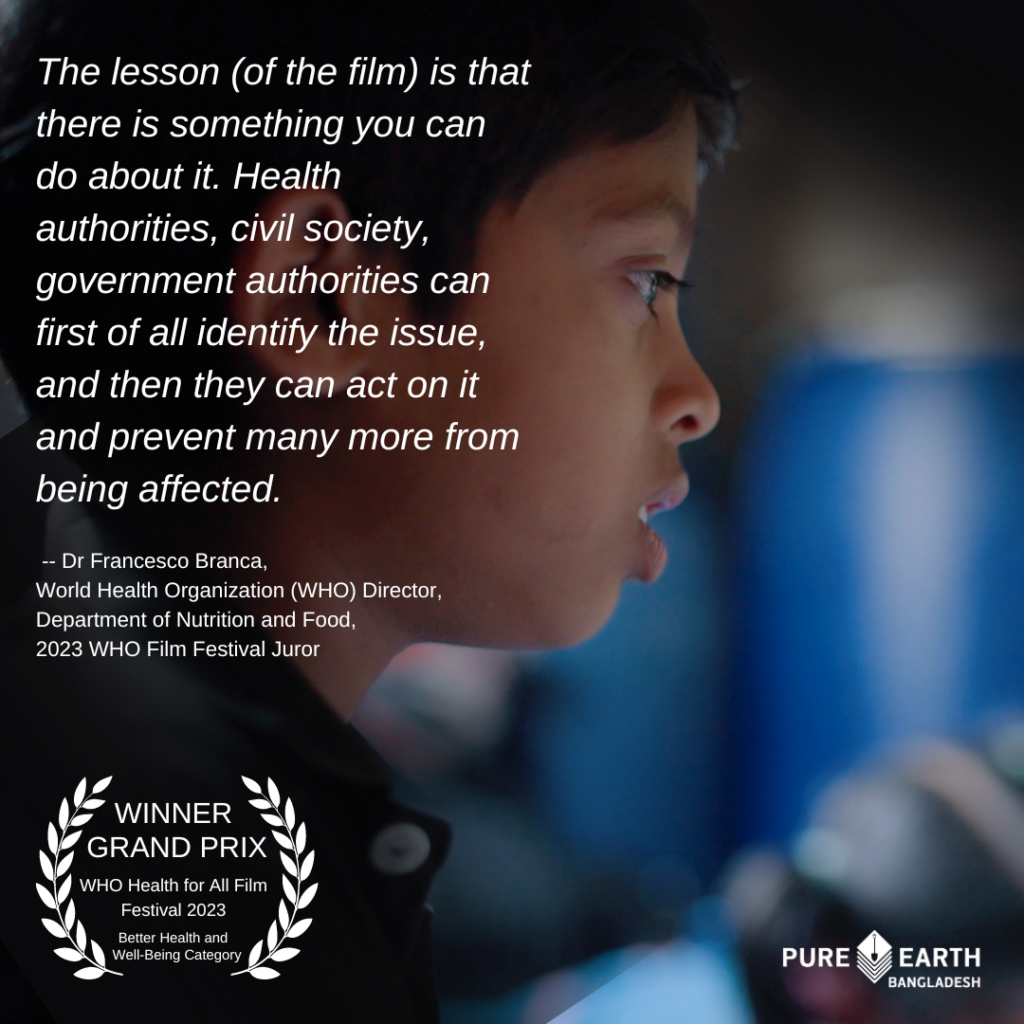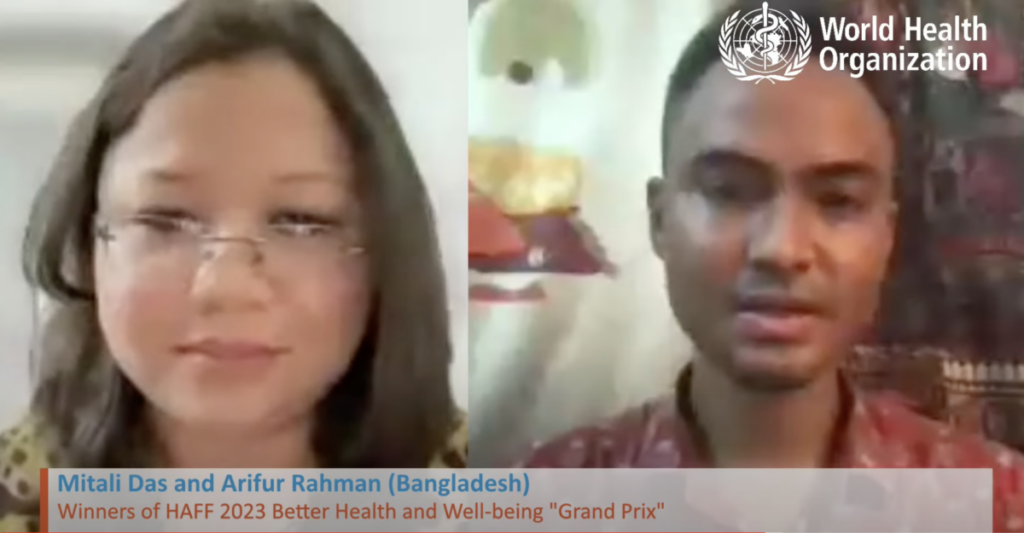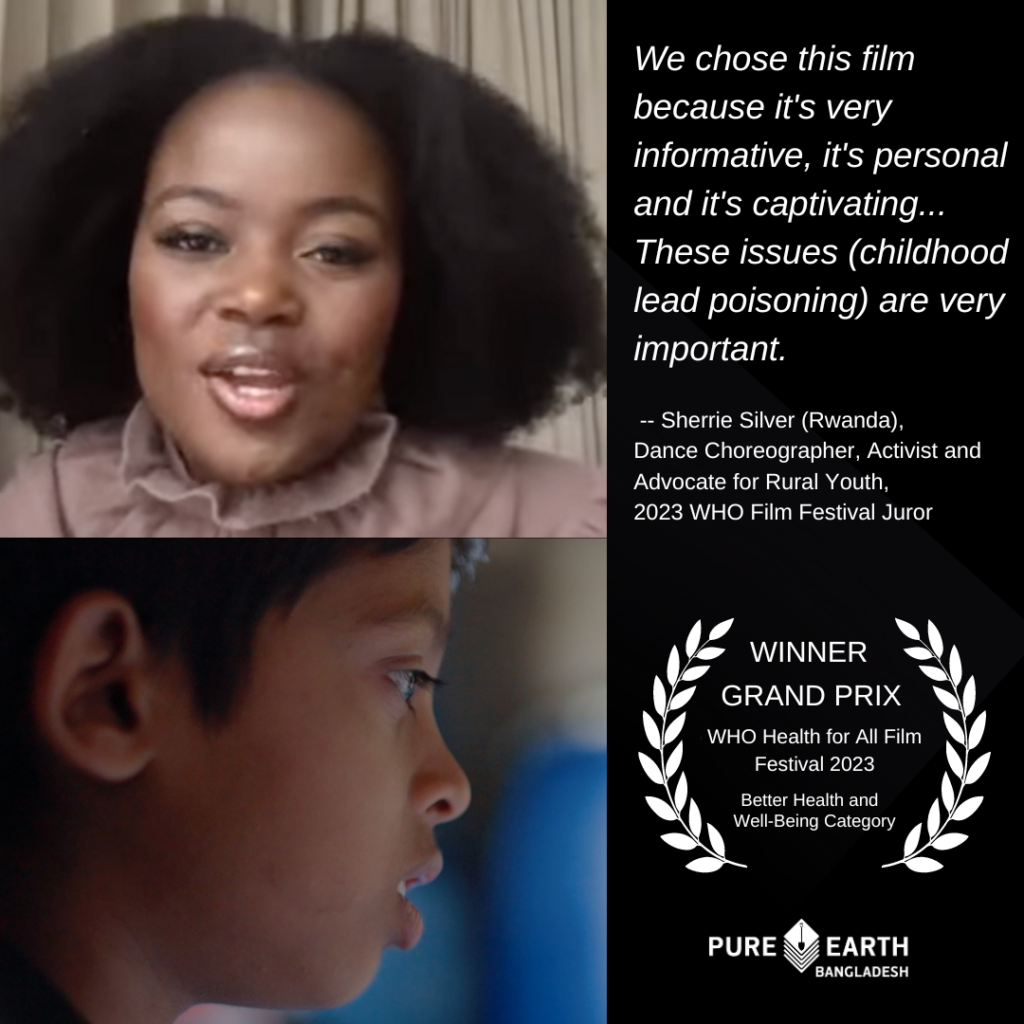“One in 36 Million” is the story of one boy, who is just one out of 36 million children living with lead poisoning in Bangladesh. The lesson of the film is that we have solutions. Help us tell this young boy’s story and give hope to future generations.
- Sign up for our newsletter to learn more about how we are helping millions of children like this young boy.
- Watch and share the short film now.
Meet one of 36 million children affected by lead
In 2022, Pure Earth began production on a short film to tell the story of a young boy who represents one of the 36 million Bangladeshi children poisoned by lead, which causes brain and organ damage.
The six-minute film, “One in 36 Million,” was named the winner of the Grand Prix prize at the 2023 World Health Organization’s (WHO) Health For All film festival in the Better Health and Well-being category.
Pure Earth met the boy and his family while doing remediation work in their village to clean up lead contamination. Pure Earth investigators had determined that the unsafe recycling of lead-acid batteries in the village had polluted the community and exposed an estimated 255 children to toxic lead. The boy and his family were among the worst impacted because they live right next to where the lead was being smelted in the open.
The film brings viewers into the boy’s world to show the reality of lead poisoning on young lives. The young boy carries the hopes and dreams of his family on his shoulders. He works hard at school, but struggles with learning difficulties due to lead poisoning.
His story is the story of millions of children who are suffering from lead poisoning. His story is also the story of millions of children who can be helped. The lesson of the film is that we have solutions. Lead poisoning can be solved.
Today, while the boy is still impacted, his village has been cleaned up and the source of lead poisoning has been stopped. He is no longer being exposed to toxic lead from unsafe battery recycling, and his family no longer smells the stench from lead smelting at night that made it hard to breathe, and lead dust no longer coats their home and the vegetables they grow and eat.

He Is Not Alone
Worldwide, lead poisoning affects 1 in 3 children globally. Bangladesh is the 4th most lead impacted country in the world, and is one of the focus countries for Pure Earth’s Global Lead Program.
In 2020, UNICEF and Pure Earth issued an urgent call to action with the release of The Toxic Truth report, which documented, for the first time, that children were being affected by lead on a massive and previously unknown scale. Since then, Pure Earth has led an all out effort to raise awareness about the problem, implement solutions, which are low-cost and effective, and help governments of some of the worst affected countries protect children from lead exposure.
With “One in 36 million,” Bangladeshi filmmaker Arifur Rahman, Pure Earth Bangladesh’s Mitali Das, and the entire production team, have managed to put a face on lead poisoning in Bangladesh and beyond.
Reaching A Wider Audience With The Prize
In an award ceremony streamed live around the world on June 6, Rahman and Das accepted the prize and noted the importance of the global platform that WHO’s recognition gives their work. Now, the boy’s story will be able to inspire more people, and influence more decision makers to make lead pollution solutions a priority.
“This film helped me to realize the grim reality of lead poisoning in Bangladesh,” said Rahman on receiving the award.
“Millions of children deserve the chance to fulfill their potential. They carry the hopes and dreams of families and entire countries. We don’t want any more children to suffer through lead poisoning. We are calling for a stop to the informal recycling of used lead-acid batteries, and for investment and action to identify the sources of lead, which is imperative to solve lead pollution,” said Das.

The boy’s story, as told in “One in 36 million” is an important one, as WHO Director-General, Dr Tedros Adhanom Ghebreyesus, indicated in a press release about the award: “Listening to the voices of people affected by health issues is a powerful way to raise awareness and improve our understanding of people’s experiences and this can help us advance towards health for all.”
“The lesson is that there is something you can do about it. Health authorities, civil society, government authorities can first of all identify the issue, and then they can act on it and prevent many more from being affected. So this is a story of one family, but it’s a story that affects many people in Bangladesh and around the world,” said Dr Francesco Branca, WHO Director, Department of Nutrition and Food, 2023 WHO Film Festival Juror.

“We chose this film because it’s very informative, it’s personal and it’s captivating… These issues (childhood lead poisoning) are very important,” noted Sherrie Silver (Rwanda), Dance Choreographer, Activist and Advocate for Rural Youth, 2023 WHO Film Festival Juror
The festival attracted nearly 800 filmmakers from 106 countries, with some 93 shortlisted films covering a range of global health issues, including “One in 36 Million” and “The Lead Rush,” another Pure Earth film that made the finals of the festival. Judges included artists and activists, and renowned names like Sharon Stone.

Dr. Francesco Branca (Italy), WHO Director, Department of Nutrition and Food Safety, HAFF Juror, holds up the prize at the awards ceremony, which streamed live to a global audience on June 6, 2023.
Learn more:
- Watch and share: “One in 36 Million”
- Learn more about the cleanup in the boy’s village
- Lead Fact Sheet
In The News:
- Bangladeshi film wins Grand Prix award at WHO’s film festival, Daily Star
- Bangladeshi documentary film wins Grand Prix award at WHO film festival, Prothom Alo English
- Bangladeshi film gets WHO’s Health for All Film Festival award, Dhaka Tribune
- Bangladeshi film wins Grand Prix award at WHO’s film festival, Eye News
- Documentary on childhood lead poisoning wins Grand Prix award at WHO Film Festival, Times of India.
- The winners from the WHO’s short film fest were grim, inspiring and NSFW-ish, NPR Goats and Soda



